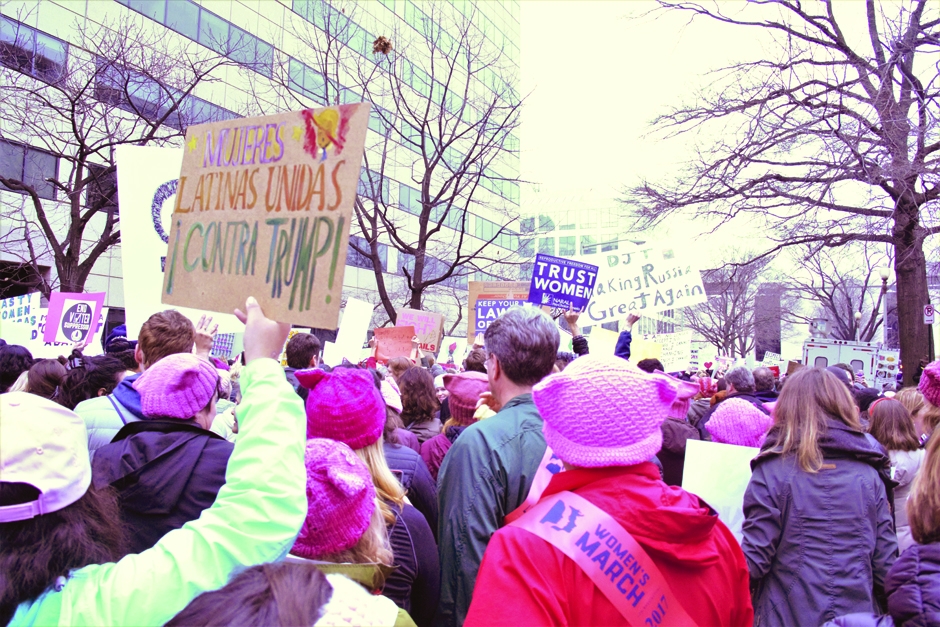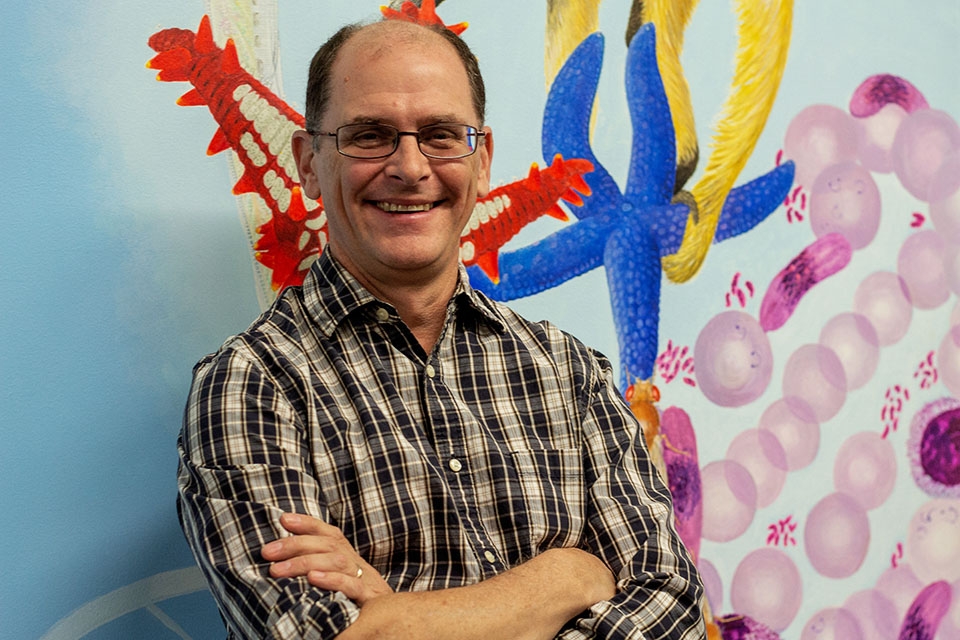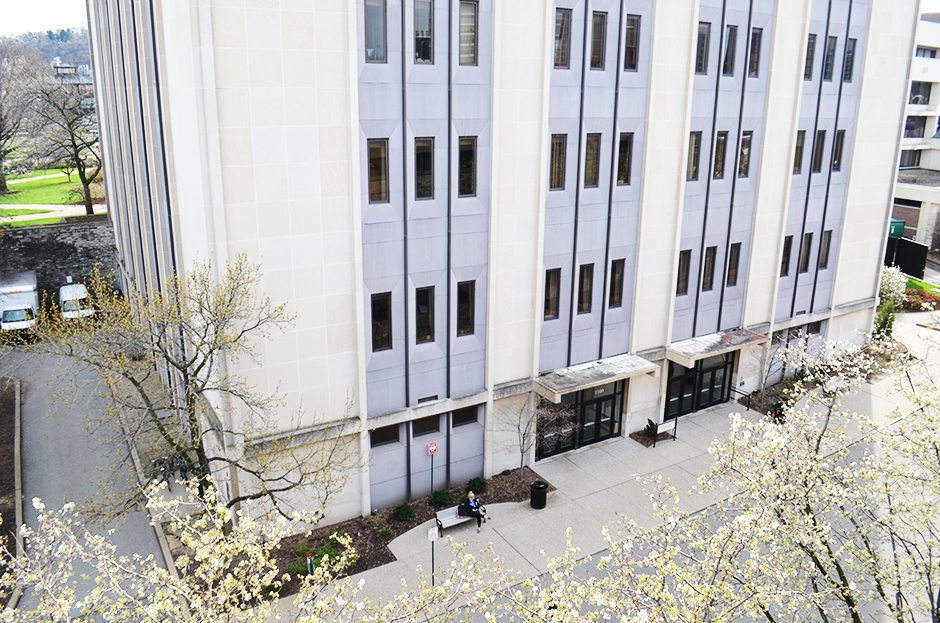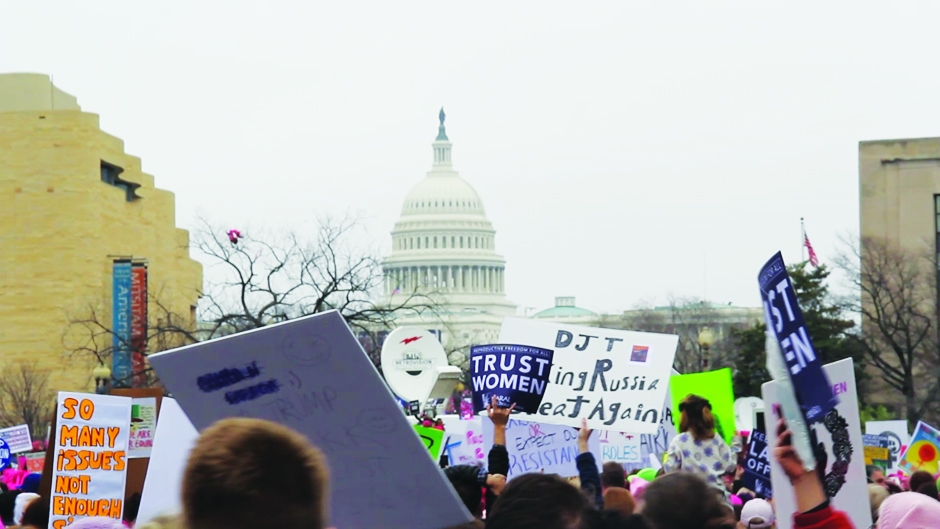
A group of picket sign-carrying Women’s March protesters move toward the Capitol Building in Washington, D.C. Jan. 21
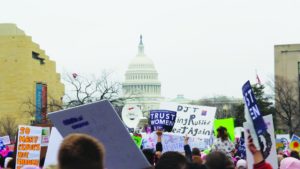
A group of picket sign-carrying Women’s March protesters move toward the Capitol Building in Washington, D.C. Jan. 21
Click here for The Duke’s video coverage of the Women’s March on Washington.
Craig Taylor | Staff Writer
At 4:15 a.m. on Jan. 21, Duquesne speech pathology graduate students Sarah Leech and Jessica Arruda loaded a charter bus headed on a four-hour trip to Washington, D.C. for the Women’s March on Washington.
“I just think it was something that I think I’ll never forget and I hope that one day I get to tell my kids about it or my grandkids about how I went,” Arruda said.
The Women’s March on Washington was organized to bring light to social issues surrounding gender, race and religion in the United States. Held the day after Donald Trump’s presidential inauguration, nearly 500,000 protestors surrounded the National Mall by that afternoon, according to the New York Times.
The Metro transit station, despite opening two hours early and adding two dozen trains, was so filled with people that at some stops riders couldn’t get on or off.
The car Leech and Arruda rode in stopped as it waited for passengers to file out of the subway. Stuck in the uncomfortable confines of a train car, the crowd inside began singing the gospel hymn “We Shall Overcome.”
“I’m not sure what word there is to describe that but I almost cried,” Leech said.
Leech carried a sign with a quote from Dr. Martin Luther King Jr. to the protest. It read, “Our lives begin to end the day we become silent about things that matter.” She chose this quote as it reflects her belief that the public must always remain vocal about social inequality.
“I think it’s really important to have a voice and stand up for what you believe in and fight for what you believe in,” she said, “especially in light of the recent controversy of the election and the people in the election.”
After leaving the Metro, the two joined the thousands of others in the streets of D.C. heading to a rally, which would be followed by the march itself. Many wore pink knitted “pussyhats,” while others held picket signs criticizing President Trump. Arruda was surprised to find that the protestors included a number of older people and younger children.
“What probably stuck out to me the most was the range of ages of people that were there,” Arruda said. “I kind of felt like we were getting the torch passed to us, but we also kind of got to see the future that was coming.”
Arruda wore this message on her shirt: “Strong women. May we know them, may we be them, may we raise them.”
“It hit all the beats that I kind of believe in,” she said. “A strong woman can be anything to anyone.”
After arriving at the site of the rally, the two encountered a dense mob of bodies. Some protesters climbed trees, as seemingly every corner of the rally was filled with a sea of pink and rainbow.
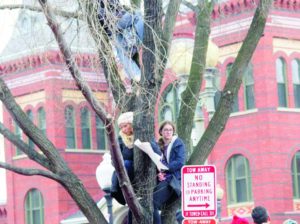
“I see a lot of nasty women out there,” said one speaker, referencing Trump’s comments regarding Hillary Clinton. She was met with a roar of cheers.
Speakers included feminist icon Gloria Steinem, women’s activist Angela Davis and singer Alicia Keys. Arruda described the atmosphere as “contagious”, “overwhelming” and “full of pride.”
While the crowd was loud and tightly packed, Arruda and Leech agreed the vibe of the event was predominantly positive.
“At that march, I never felt unsafe, and there were half a million people there,” Leech said.
After the rally, the march was scheduled to begin at 1:15 p.m., but by that point, the entire parade route was filled with protesters, so there was nowhere to go. After an hour, the crowd overflowed onto the streets beside the rally and defected into rouge marches. Even still, demonstrations remained peaceful, and D.C. police reported no arrests resulting from the event.
Arruda says seeing so many people of different backgrounds coming together for social equality is something that will always stick with her.
“Hopefully it’s a catalyst for change, because the number of people that were there and all the marches all over the world really showed that people want change,” she said.
Despite the inclusivity of the march, anti-abortion groups say they were not invited to join the event. Students for Life of America report being “harassed and spat upon” by opposing protesters when they showed up.
Republican presidential candidate Carly Fiorina told Fox News that although many of her beliefs aligned with those held by other protesters, she says she was unable to participate.
“I certainly have been public in my criticism of some of the things that Donald Trump has said in the past … Sadly, pro-life women were not welcome at this march. I’m pro-life,” Fiorina said.
Despite several opposing advocacy group reportedly not being invited to the nationwide Women’s March events, the projected turnout is one of the largest for a protest in US history. Adding together the D.C. event and the sister marches from around the country, Yahoo News reports between 3.3 million and 4.6 million protesters nationwide participated in demonstrations in the name of equality. If accurate, it means one in 100 Americans were involved in a women’s march that day.
“It kind of restored my faith in humanity,” Leech said. “Because before this, I was angry as all get-out and I don’t get angry easily. There was like a fire that was infused [in me], but I feel like now it’s a little more on the positive side, like I’m more ready.
“I’m just very proud to be on the right side of history and it gives me more hope and inspiration to keep fighting for future generations.”
